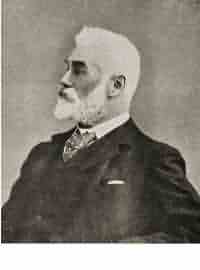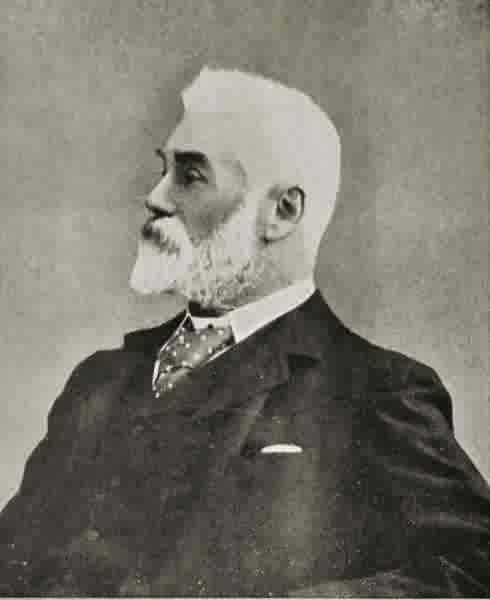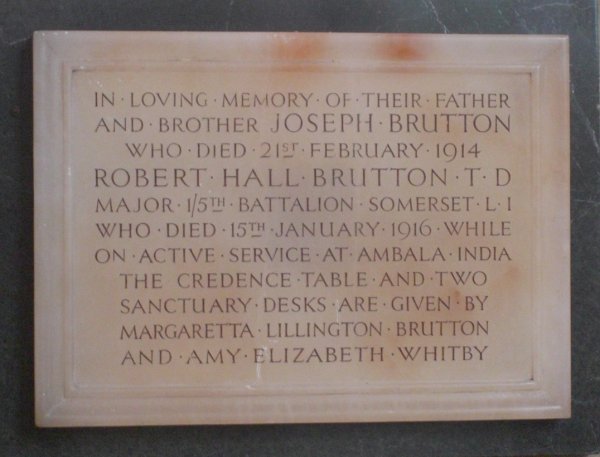Yeovil people
joseph brutton
Brewer, Wine & Spirits Merchant
 Joseph
Brutton was born
on 25 May 1831
in Exeter,
Devon, and
baptised on 17
June 1831 at St
Mary Major
church, Exeter.
He was the son
of Joseph Able
Brutton
(1795-1837),
gentleman, and
Margaretta née
Browne
(1797-1874). Joseph senior
was in the
licensed trade
and various
leases survive
for some of the
pubs he owned in
Exeter including
the Oat Sheaf in
Fore Street
(1821), the
Black Moor's
Head in Westgate
Street (1825,
1837), the
Antelope in St
Sidwell (1827,
1837), the Paper
Makers' Arms in
Exe Lane (1837),
the Union in St
Carrion (1837),
the Jolly Sailor
in Holy Trinity
(1837), a
dwellinghouse
and malt house
in Preston
Street (1837),
and the King's
Arms in Stoke
Canon (1837).
Joseph
Brutton was born
on 25 May 1831
in Exeter,
Devon, and
baptised on 17
June 1831 at St
Mary Major
church, Exeter.
He was the son
of Joseph Able
Brutton
(1795-1837),
gentleman, and
Margaretta née
Browne
(1797-1874). Joseph senior
was in the
licensed trade
and various
leases survive
for some of the
pubs he owned in
Exeter including
the Oat Sheaf in
Fore Street
(1821), the
Black Moor's
Head in Westgate
Street (1825,
1837), the
Antelope in St
Sidwell (1827,
1837), the Paper
Makers' Arms in
Exe Lane (1837),
the Union in St
Carrion (1837),
the Jolly Sailor
in Holy Trinity
(1837), a
dwellinghouse
and malt house
in Preston
Street (1837),
and the King's
Arms in Stoke
Canon (1837).
By the time of the 1851 census his father had died and his mother was living at 2 Friars Walk, Exeter, with her eldest son Thomas age 24, who was curate of Brixham, Joseph aged 19 described as a brewer and her daughter Laura, a 15-year-old scholar. Also living with them was Joseph's paternal grandmother Martha, aged 80, and a general servant.
By 1854 Joseph had moved to Yeovil and entered into business with Thomas Cave who had established a brewery behind his house in Princes Street. The company originally started life as Kitson & Cave, subsequently Cave's and from 1854 as Cave & Brutton. Thomas Cave was a very active Yeovil Freemason and Joseph Brutton is known to have joined Yeovil's Lodge of Brotherly Love on moving to Yeovil. He was initiated of 16 November 1853 and served as the Lodge's Worshipful Master in 1860.
On 11 April 1860 in the parish church at Osmington, Dorset, Joseph married Elizabeth Lillington Hall, the daughter of gentlemen Charles Hall and Elizabeth née Lillington. On his marriage certificate Joseph described his rank as gentleman and his residence at the time of marriage as Yeovil, Elizabeth gave her residence as Osmington. Joseph and Elizabeth were to have four children; Margaretta, Robert Hall, Amy and George. In the 1861 census they were listed as living in Princes Street and with them was month-old baby daughter Margaretta, his mother Margaretta and two servants. Joseph, now aged 29, described his occupation as 'Brewer, Wine and Spirits Merchant' (abbreviated on the form). Elizabeth died on 18 May 1869 and was buried in Yeovil Cemetery.
In 1870 Joseph was elected by the Vestry as the town's nominated Churchwarden at St John's and was re-elected in 1871, 1872 and 1873.
In the 1871 census Joseph was described as a widower aged 39 and gave his occupation as 'Common Brewer, Wine and Spirit Merchant, Master, employing 20 men'. Living with him were Amy and George and his mother Margaretta as well as a housekeeper, cook, housemaid, and a nursemaid.
On 24 January 1872 at the parish church of Buckland Newton, Dorset, Joseph married Mary Georgiana Cull, daughter of gentlemen James Cull of Buckland Newton. On his marriage certificate Joseph gave his profession as Brewer. Joseph and Mary were to have nine children, mostly born in Yeovil; Alice, Laura, Joseph, Marion, Arthur, Bessie, Henry, Evelyn and Beatrice.
Joseph Brutton was a partner in the firm of Brutton & Pope, Wine and Spirits Merchants of Princes Street. The other partner being wine importer Floyer Bulstrode Pope. Pope, however, died in 1885.
Joseph Brutton was described as "a rather striking figure, erect and grey-bearded, immaculately dressed in frock-coat and silk hat. He had a large family including two beautiful twin daughters."
In 1880 Joseph was listed in "Breeders of Jersey Cattle in the UK, 1880" as J. Brutton, Yeovil, Somerset, England. This, at first glance, appears to be a little incongruous however the extensive land holdings of Frederick Greenham were sold off following the death of Frederick's widow Mary in 1889 and in the sale details it was shown that Joseph rented a five acre pasture field off Horsey Lane. The sale description in the Western Gazette edition of 10 May 1889 read "Lot 8, a close of rich pasture and garden land, also situate in Horsey's Lane, in the occupation of Mr Joseph Brutton, and comprising 5a 0r 25p, was bought by Mr Henry B Batten for £600 (about £57,000 at today's value).
In the 1881 census Joseph and his family were recorded at 7 Princes Street. Living with them were 8 children ranging in age from 20 to 10 months, as well as a cook, general domestic servant, housemaid and 2 nurses. Joseph listed his occupation as "Brewer & Wine Merchant, employing 36 men & 3 boys". The 1891 census listed him as a "Brewer, Wine & Spirits merchant", at 17 Princes Street.
|
In the 1891 edition of 'Where to Buy' Joseph Brutton's business was given the following description -
Mr
Joseph
Brutton
The
greatest
national
beverage
of
England
is
undoubtedly
beer,
and it
is of
national
importance
that
this
liquor
should
be
supplied
in a
sound
and
wholesome
condition. For many years the business was carried on under the name of Cave and Brutton; the present proprietor has had a long and valuable experience in the trade, and by modernising, when occasion required, the appliances technically called the "plant," by his careful supervision and selection of the ingredients, has fully maintained the high reputation previously acquired. In order to supply the malt, two large malt-houses are kept constantly at work during the season, the most recent improvements having been introduced into every branch of the manufacture. The cisterns in which the barley is steeped are constructed on the best principles, and in the germinating cases the grain is worked and turned by patent machinery. The kilns are provided with self-acting ventilators, and to ensure the utmost efficiency, the kiln floors are double. The malt-crushing mills, the hoists and elevators are worked by engine power, one being a gas engine and the others steam. The Brewery is equipped with two mash-tuns, coppers, backs, coolers and refrigerators, these being of the best and newest character, while the fermenting vessels are provided with attemperators, parachutes, and every appliance to facilitate the work and ensure its being performed in a steady and reliable manner. Storage rooms are provided for malt and hops, and a stock of the best English hops is always kept in reserve. Attached to the Brewery are large vats and cellars for the storage of beer, while adjoining is the yard for washing and purifying the casks previous to filling them. The water for supplying the brewery is pumped from a artesian well on the premises, and is noted for its purity and perfect suitability for brewing purposes.
The
greatest
care is
taken to
time
each
operation
to the
requirements
of the
case,
and to
preserve
the most
scrupulous
cleanliness
throughout.
The malt
and hops Brewing is now a science, and no greater proof of the success of this manufactory could be adduced than that notwithstanding the extraordinary competition in the trade during recent years, and the immense sums spent in machinery and in procuring skilled scientific managers by the large breweries, Mr Brutton has been able not only to hold his own, but to make advances, and, by offering a superior beer to the public at a moderate price, to practically meet all opposition. A wine and spirit business is also attached; a long succession of ports of the finest vintages, together with sherries, brandies and champagnes from the most noted shippers, very old Scotch and Irish whiskies, and a choice and varied list of other liqueurs of guaranteed quality being always on hand.
Mr
Brutton
is also
engaged
in an
undertaking
of a far
different
character;
we refer
to his
model
dairy
farm, on
which
over 50
thoroughbred
Jersey
cows are
kept.
The
dairy is
scrupulously
clean,
one of
De
Laval's
"Separators"
being
used to
separate
cream
from the
milk.
This
machine
is
driven
by a gas
engine,
which
also
supplies
the
motive
power
for corn
crushing,
root and
chaff
cutting.
The
greatest
care is
taken to
supply
the
cattle
with
pure
water,
the town
water
having
been
laid on
to the
meadows
where
they
pasture.
Mr
Brutton's
name is
well
known in
the
show-yard,
exhibits
from his
herd
having
been
made at
the
Royal,
the Bath
and West
of
England,
and
other
principal
meetings.
Over 90
prizes,
as well
as the
silver
medal of
the
English-Jersey
Cattle
Society,
the
gold,
two
silver,
and
bronze
medals
of the
British
Dairy
Farmers'
Association,
Thorley's
silver
cup on
two
occasions,
and a
large
number
of
honour
certificates,
have
been
awarded
to these
beautiful
animals
during
the last
three
years. |
Joseph retired due to ill-health in 1893 and moved to Eastbourne, Sussex. He died on 21 February 1914 aged 82 and his probate in the sum of £2,337 (£230,000 in 2017's value) was handled by his son Henry.
gallery

From my
collection
Joseph Brutton
1831-1914

Memorial erected to the memory of Joseph Brutton and his son Robert in St John's church.